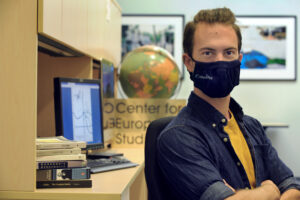By Sarah Lofstrom, Graduate Writer
Meet Brett Harris! Brett is a senior double major in ECL and European studies working on an undergraduate honors thesis project investigating the role of objects in the works of Franz Kafka, Jorge Luis Borges, and Vladimir Nabokov.
What is your favorite thing about being an ECL major?
Definitely the faculty! I’ve been really fortunate to have taken courses with a great variety of scholars, and the diversity of their interests, experiences, and research has been so inspiring. Likewise, the way ECL faculty members have challenged me, and taken an interest in my success in and outside the classroom has had an enormous impact on my post-undergrad trajectory.
What are the most exciting aspects of your research in the humanities?
For me, research in the arts and humanities is all about making space. Sometimes this is finding connections between seemingly irreconcilable concepts, and other times it means celebrating difference. Either way, simply creating room in the discussion for pondering “what it means to be human,” in all its various triumphs and problematics, invites introspection and critical thinking about a vital topic that is often taken for granted. But by taking the time to interrogate “humanity” and its history, and to engage others in this discussion, researchers have the ability to foster dialogue across difference and conflict, which is something we really need–now and always.
What do you perceive to be the most valuable skills have you gained from your research experience so far?
Foremost, my honors thesis has taught me to be agile and adaptable. I started my current project knowing I wanted to write about Kafka, Borges, and Nabokov, but the specific focus
of my paper didn’t really emerge until I read a book by an author who was decades and continents removed from these three. Being open to unexpected encounters, and maintaining the flexibility to incorporate them into my research has been extremely rewarding. More broadly, this project has definitely uncovered depths of motivation and perseverance that I hadn’t previously tapped, and challenged me to improve my own style of project management.
How do you see these skills transferring to a future career in the academy and beyond?
Academically, my research in arts and humanities is definitely preparing me for further research and critical engagement with public history and humanities. I’ve really benefited from having to develop my own research and then learn how to make it accessible to others, which are skills that could definitely lend themselves into further scholarship and teaching. Outside the university, these skills have helped make me well-rounded and versatile—I could take my comfort with comparative perspectives into diplomacy, communications, consulting, translation, education… The list goes on, but generally, my path to research has helped me develop the soft skills and the determination to pursue a very wide variety of careers, which is really quite liberating!
What resources were most useful when searching for these opportunities? How did you get started?
More than anything, my relationships with faculty and graduate students have been an invaluable resource. Most of the opportunities I’ve found were based off of recommendations from professors. Taking the time to ask my professors about their research, discuss career paths, or seek out advice on a certain topic really paved my way forward in terms of having a network of individuals invested in my success and trajectory. For someone unsure of where to start building these relationships, I’d recommend a piece of advice that I sometimes still struggle with—go to office hours! This time is an amazing opportunity to learn more and build relationships. If that’s still a little daunting, another great way to get involved is to watch department listservs—they typically have info on informal events and other research opportunities.
photo credit: Donn Young


